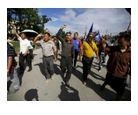
Demonstrators armed with spears and axes killed eight police officers in western Nepal on Monday during escalating protests against a proposed new constitution, officials said.
The government announced a curfew and plans to send in the army to Kailali district in the country’s remote far west, where authorities said there were reports that three demonstrators may have also died.
“So far I can confirm that eight members of our security forces have been killed, including two paramilitary personnel,” home ministry spokesman Laxmi Prasad Dhakal said.
“An indefinite curfew has been imposed in the area from 4pm today,” Dhakal told AFP.
Anger has been building for weeks in Nepal’s western and southern plains after lawmakers struck a breakthrough deal on the long-awaited charter in June, spurred by April’s devastating earthquake.
The charter was meant to draw a line under centuries of inequality but its plan to divide the country into seven provinces in a draft presented in parliament on Sunday has sparked fury among marginalised communities, who say the new borders will limit their political representation.
Monday’s violence erupted as police attempted to prevent protesters from entering restricted areas and from vandalising government offices in the town of Tikapur, 420 kilometres (260 miles) west of Kathmandu, Home Minister Bam Dev Gautam told parliament.
“All of a sudden protesters encircled the police and attacked them with knives, axes, sickles and spears,” Gautam said.
He said demonstrators also set fire to one of the paramilitary officers—although it was unclear if he survived the attack.
“Inspector Ram Bihari Tharu of the Armed Police Force was burnt alive,” he said.
More than 40 security personnel were injured in the clashes and were taken to Tikapur hospital, district chief Raj Kumar Shrestha said.
Another official, deputy district chief Udaya Bahadur Singh Thakuri, warned that the death toll could rise.
“We have heard reports that... three protesters have also been killed, we are trying to confirm the details,” he told AFP.
Army deployed
Nepal has seen a string of protests in recent weeks, organised by members of historically marginalised communities including the Tharu ethnic minority, which has struggled to overcome decades spent as bonded slaves to high-caste landowners.
The latest clashes broke out when Tharu activists held a protest to demand their own separate province.
Tharu lawmaker, Ganga Chaudhary, who staged a torch rally in Kathmandu two weeks ago, blamed the authorities for the escalation of protests.
“Tharus are a peaceful community and we have been putting our demands for an undivided Tharu province peacefully, but our voices were not heard,” Chaudhary told AFP.
“This violence is an unfortunate consequence of the rage that has been brewing...if the government listens to Tharus, the situation could calm down,” she said.
Minister Gautam said the government would send troops to the area to try to bring the situation under control, and appealed for peace.
“At a stage when we are heading to a new era... we must call on people to not be involved in activities that disturb social harmony and ignite ethnic hatred,” Gautam told lawmakers.
He said the area had been declared a “riot-stricken zone” and the army deployed.
Regional parties have long pushed for new provinces to be created along lines that could favour historically marginalised communities, but other lawmakers have opposed such proposals, saying it would be divisive and threaten national unity.
Work on a new national constitution began in 2008, two years after the end of a Maoist insurgency that left an estimated 16,000 people dead and brought down the 240-year-old Hindu monarchy.



